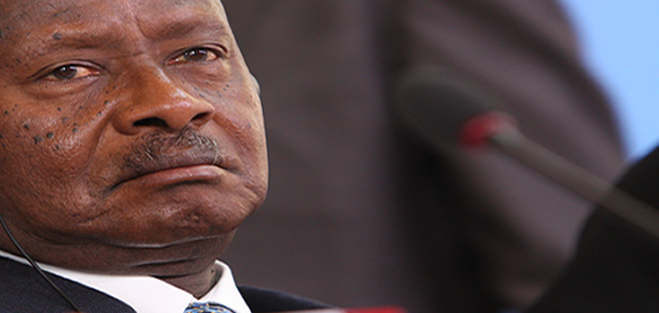By Kafia Omar
At his inauguration ceremony recently, Uganda’s President Yoweri Museveni stated the ICC was “a bunch of useless people.”
Among the dignitaries present was Sudan’s President Omar-al Bashir, against whom there is an outstanding International Criminal Court (ICC) arrest warrant.
“When they started, we used to take the ICC serious but not anymore.
They are a bunch of useless people who should not be taken serious. We have no business with the ICC and so we welcome our brother from Sudan President al-Bashir,” Museveni said at the ceremony.
This is not the first, and it is unlikely to be the last, time that Museveni has used a public occasion to express his dislike for the ICC.
In October 2014, during Independence Day celebrations, he criticised the ICC for scheduling Kenya’s President Kenyatta’s status conference on the same day, despite a request for postponement from the Kenyatta camp, asking “Was the aim of ICC to disrupt our summit?”
Museveni’s recent statement has particular irony given that Uganda is currently cooperating with the Court on the case of Dominic Ongwen.
It should also not be forgotten that it was Museveni who, in December 2003, took the decision to call on the ICC to investigate human rights violations, including crimes against humanity and war crimes, committed by the Lord’s Resistance Army.
Furthermore, under his leadership, Uganda enacted the International Criminal Court Act incorporating certain provisions of the Rome Statute into national law in 2010. All of this points to the fact that Museveni sees the ICC as a court of convenience to prosecute his “enemies”, while deploying rhetoric against it to “protect” his “friends”.
Such anti-ICC comments, while not new, appear to be increasing. Earlier this year, a number of African Union member states supported a proposal made by Kenya to withdraw from the court criticising it for only being preoccupied with countries in the region. However, the conclusion was that it would be left to individual states to decide.
While it cannot be denied that all cases so far – except one –focus on Africa, five of these (including the Uganda case) were referrals by the African states concerned themselves. Of the others, two were referred by the United Nations Security Council; only two African investigations were opened
by the ICC Prosecutor-propio motu.
There is no doubt that Museveni was fully aware of the impact of both the attendance of Bashir at his inauguration, and his statements against the ICC. What was possibly not predicted was the reaction by the American and European delegates who attended the ceremony, who walked out in protest. Elizabeth Trudeau, from the US state department, said: “We believe that walking out in protest is an appropriate reaction to a head of state mocking efforts to ensure accountability for victims of genocide, war crimes and crimes against humanity, particularly when his country has committed to accountability as astate.”
The case of Sudan
What makes the performance particularly galling is the fact that the crimes with which Bashir was charged (including large-scale extermination, murder, rape, torture, forcible transfer and
pillaging of civilians) are ongoing. Gross human rights violations continue to take place on a daily basis in Darfur and renewed fighting has displaced 129,000 since January 2016.
The Sudanese government continues to launch indiscriminate aerial bombardments against civilians in Darfur, Southern Kordofan and Blue Nile, displacing entire communities and killing countless people, including six children under 12 on 1 May 2016. Three of the children were from the same family.
The lives of civilians living through this bombardment have been further jeopardised by Bashir’s refusal to allow humanitarian organisations access to rebel-held areas.
This is not the first time Bashir has travelled freely despite the arrest warrant against him to Rome Statute state parties, despite their clear legal obligation to cooperate with the ICC. Just last week, in defiance of a 2011 judgment of the ICC’s Pre-Trial Chamber I to report Djibouti (also a state party to the Rome Statute) to the Security Council for its failure to cooperate with the ICC in arresting the Sudanese president, the government hosted Bashir at the Djiboutian leader’s inauguration ceremony. A recent ruling by South Africa’s Supreme Court stated that the authorities’ failure to arrest him was “disgraceful,” following a legal appeal for his arrest brought by the Southern African Litigation Centre on the occasion of his attendance at the AU Summit in June 2015.
Conclusion
The fact that Bashir continues to travel freely despite his arrest warrant undermines the authority of the ICC and quashes the hopes of victims of achieving justice. Read more:
Uganda had an opportunity to prioritise justice for victims over political interests, but once again, those who are seeking justice have been left disappointed.
The writer works with International Refugee Rights Initiative.







